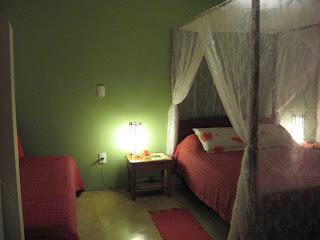
Should you go to Brazil? Should you get off the beaten path and visit Arraial D'Ajuda, Cumuruxatiba, Corumbau, Caraiva, Espelho, Trancoso, Santo Andre, Belmonte? Should you stay in a pousada rather than a resort? I was evaluating all these things for myself, and came up with my top ten list of things a potential visitor should consider. My advice probably won't hold true in some other places in Brazil, but it may provide a template for questions to ask.
- If you don't speak Portuguese, pick a pousada where the owner speaks your language, and get a "transfer" (taxi) from the airport to the place you'll be staying. Find a pousada that is walking distance to places to eat, if you don't want to deal with having to find a taxi. Note that most Brazilians speak only Portuguese.
- Don't rely on your US or UK ATM card working. Sometimes it will; often times it won't. Travellers checks are also not widely used. Bring Brazilian reais with you. You can find the exchange rate on xe.com and order money online if you're in the US. (It arrives by Federal Express from Travelex, and someone over 18 must sign for the cash.) You'll need plenty of 2 real notes (about $1) to give to porters for tips. Other service (usually 10% is included in the bill. One great thing about pousadas is that you can just order drinks and it goes on the invisible tab, to be settled at the end of your stay.
- Travel with only what you can carry. Ditch the evening dress and high heels. Bikinis are worn by all shapes and sizes, and shorts and t-shirts are the most common attire for morning, noon and evening. You probably won't have anywhere to wash your clothes, so keep in mind that white clothes get dirty very quickly around sand! Note also, that voltage varies in Brazil. In Rio, for example, it's 110; in Bahia, it's 220.
- Bring plenty of sunblock and bug spray. When it's very windy, there are few insects, but if you're susceptible to bites, use something like Buggspray TM, particularly at dawn and dusk (between 5:30 and 6:30 morning and evening.). I had expected to experience no-see-ums, but none seem to exist at this time of year on this coast.
- Go to Brazil in off season if you want to find some of the best weather and no crowds. Avoid June and July (the rainy season) and avoid from December through March (after Carnival/Easter). October/November and April/May are good times to consider--though no one can guarantee the weather. If it rains, you have to be self-sufficient. The part of Bahia we visited would probably not be a great place for kids, but check out hiddenpousadasbrazil.com for other possibilities.
- Don't go off the beaten track if you're susceptible to illness, or are taking medication. You may find that there are no doctors at all. Pharmacists prescribe and sell all kinds of medications, but they're unlikely to check whether what they recommend is compatible with your medical situation. I strongly advise getting insurance for a trip like this.
- Hire a car only if a) you're fluent in Portuguese or b) you don't mind getting lost, navigating bumps, bicycles or scooters or c) you relish the challenge of sand/dirt roads with no signposts.
- Be prepared to go with the flow. Rooms are likely to be clean and fairly basic. (Remember, they usually also cost very little.) Commonly, there's only one cold tap in the sink. Most of the time there's hot water in the shower (no bath), but not always. Hair dryers are rarely provided, so looking beautiful may be a challenge. If any of those things bother you, or if you want tennis or golf or major water sports, you'd probably be much happier at a resort. Of course, you probably wouldn't see the real Brazil...
- Make this a vacation, not an alternative work venue. Sometimes the internet works; often it doesn't, or is interrupted mid-stream. Plus, it's really hard to work when an idyllic beach is 50 yards away and you're sitting in a deck chair.
- Consider the services of someone like Alison McGowan, who can customize a trip for you, and also accompany you. Alison's role as travel interpreter allows you to take a trip off the beaten path and still have peace of mind. You won't get lost, even in the most remote locations, you can discover places of local interest, and see the authentic Brazil that few tourists experience. A travel interpreter is there when you need her, even to to interpret at evening meals, and inconspicuous when you want to be by yourselves. You can find Alison at HiddenPousadasBrazil.com.











